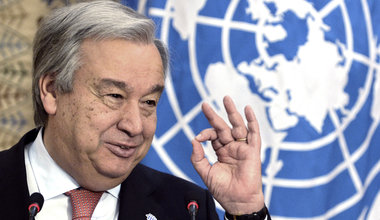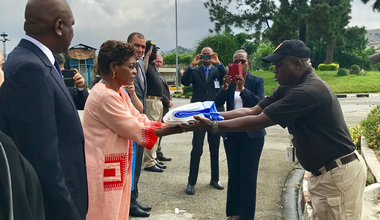Workshop on the law, chieftaincy and rural land ownership: participants opt for better conflict resolution

Some 25 traditional and community leaders, members of women's and youth associations from 32 villages in the Blolequin area, situated at about 580 km west of Abidjan, on 10 and 11 June 2015, took part in a workshop on the law on rural chieftaincy and land ownership organised by the United Nations Operation in Côte d'Ivoire (UNOCI).
Speaking at the opening ceremony, UNOCI's Civil Affairs coordinator in Toulepleu, Hélène Sylvie Zomahoun Ekouedjin, said that the objective of the workshop was to inform participants on the contents of the different laws governing rural chieftaincy and land ownership, try to find responses to their concerns, and propose solutions to problems concerning the two themes of the workshop.
The workshop also serve to build participants capacity on the two subjects through different presentations. The deputy prefect of Central Blolequin, Claude Koffi Yao Kan, made a presentation on ''The Law of Chieftaincy: role and function of the village chief in social cohesion and the electoral process » with regard to Law Nº 2014-428 of 14 juillet 2014 on the status of kings and traditional chiefs.
For their part, the representatives of the Legal Clinic, the Norwegian Refugee Council, the Post-crisis Support Project, the Society for Forest Development and the NGO Rural and Agricultiral Development of the West focused on Law No 98-750 of 23 December 1998.
Edouard Munyeshuli of UNOCI's Human Rights Division raised issues linked to international property rights and women's access to land.
The discussions which followed the various presentations and working groups provided an opportunity for participants to raise recurring problems encountered by villagers. With regard to the issue of chieftaincy, participants discussed issues such as contesting the authority of chief, the interference of local officials in chieftaincy issues. On the problem of land ownership, participants noted the illegal occupation of forests and plantations, the illicit selling of land, the compulsory land purchase by people who have left their village to seek refuge elsewhere, the non-registration of land and chaotic land boundaries.

Three theatre groups performed sketches on land ownership and chieftaincy which served to teach practical lessons. The traditional and community leaders, members of women's and youth associations made a commitment to always consensus in village affairs and to respect the different laws on chieftaincy and rural land ownership in order to find the best ways of resolving conflicts.
At the end of the workshop, the secretary-general of Blolequin prefecture, Kouamé Ouffoué, thanked UNOCI for its constant involvement in the search for lasting solutions to land and chieftaincy problems. He made the following plea to participants : « The quality of the different presentations means that you have been really well trained and have received useful information on the issue of chieftaincy and rural land ownership. I encourage you to ensure that this information is passed on to as wide an audience as possible in the villages. And in addition, put into practice the good lessons you have learnt in order to promote peace and reconciliation ».
It should be noted that the woerkshop was organised as a follow up to a recommendation made during a roundtable discussion on the challenges linked to social cohesion initiated by UNOCI for community leaders in Blolequin on 20 and 21 April 2015 and whose closing ceremony was attended by the Special Representative of the United Nations Secretary-Genera for Côte d'Ivoire, Mrs Aïchatou Mindaoudou.
 UN
UN United Nations Peacekeeping
United Nations Peacekeeping










